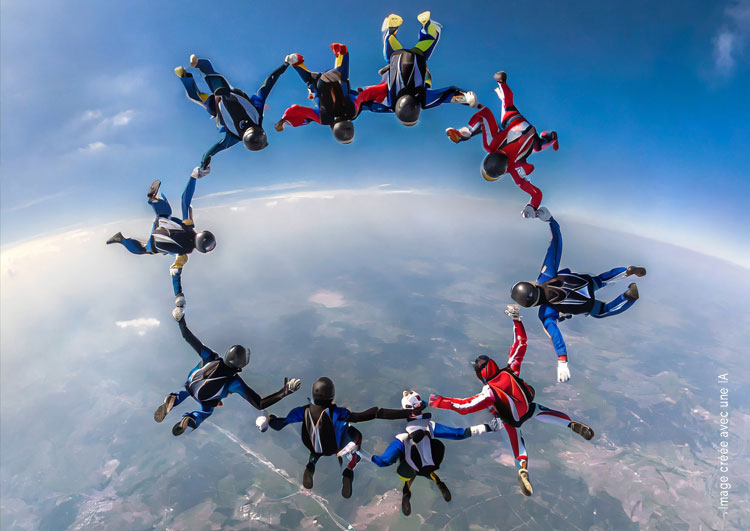“ The collective intelligence factor is not strongly correlated with the average or maximum individual intelligence of group members but is correlated with the average social sensitivity of group members, the equality in distribution of conversational turn-taking, and the proportion of females in the group. “
Anita Woolley, MIT
Our group intelligence is correlated with our emotional intelligence!
So, how can we strengthen it?
What is a smart team?
It is a group of individuals who work together effectively and productively, utilizing their skills and knowledge to achieve common goals.
The members of a smart team collaborate closely, sharing ideas, information, and resources. They work together synergistically, valuing the diversity of opinions and skills. Through clear, open, and respectful communication, each member shares their ideas, concerns, and suggestions without fear. A key talent of these teams is flexibility and the ability to quickly adapt to changing situations, learning new skills to tackle challenges or reconsider approaches. Of course, success also hinges on trust!
In these teams, leadership isn’t reserved for a single person on all subjects, and each individual can take on a leadership role at a given moment based on their specific skills and knowledge. The presence of women is an asset because, statistically, they possess higher emotional intelligence. The relationship between the proportion of women in groups and performance can be largely explained by the dimension of social sensitivity, as women generally score higher than men in this regard.
Emotional and social skills are also crucial, as each person needs to feel psychological safety to create a positive and supportive work environment. Having a good understanding and management of one’s emotions, for instance, enables the constructive handling of confrontations. And knowing how to manage conflicts before they escalate is a key success factor. Lastly, regularly providing and receiving impactful positive and constructive feedback contributes to a lasting improvement in collective performance.
Obstacles to collective intelligence
However, several obstacles can dampen group intelligence: the conformity bias, which drives adopting the majority viewpoint; the lack of information sharing; the confirmation bias, which leads to selecting information and arguments exchanged that support and confirm one’s own perspective. To counter these mechanisms, the acceptance of positive confrontation through contradictory debates is necessary to foster the emergence of intelligent collective decisions.
Among other obstacles, a rigid hierarchical structure or excessive authority can inhibit the free expression of ideas and contributions from all team members. The same holds true in the case of a lack of diversity, whether it be cultural, gender-related, age-related, or expertise-related, as it brings a variety of ideas and perspectives that enrich collective thinking. Sometimes, excessive time or resource constraints prevent the group from dedicating enough time to reflection, discussion, and exploration of different options, limiting the generation of innovative ideas or informed decision-making.
So, how do we navigate these pitfalls?
The right to make mistakes: the first thing to do when opening a discussion in a meeting is to clearly announce to all participants that it’s okay to make mistakes and that ‘test and learn’ is key to learning.
Embrace ‘healthy conflict’ by owning your differing point of view and, if possible, holding your position for a while.
Embrace the diversity of viewpoints within the entire team: it has been shown that the team’s maximum IQ doesn’t determine collective intelligence. It’s emotional intelligence and psychological safety that drive the team’s success. Seek out the opinions of introverted individuals, those who think differently, and both less experienced and more experienced members. Let’s remember that it was an intern who came up with the Nike slogan ‘Just do it’. Neuroscience has demonstrated that team creativity can be learned, nurtured through research, participating in ‘Leadership expeditions,’ and taking the time to meet and exchange ideas.
How can the leader leverage collective intelligence?
The leader has the ability to harness the power of collective intelligence by actively listening to the expectations of others, suggesting effective methods to achieve goals, and providing a coherent and meaningful vision for the future. The organization has recently emphasized ‘doers,’ so it’s time to further promote ‘doers/listeners’ to face complexity. The leader knows how how to bring the group together and to offer a unifying sense of purpose that brings energies together. This is achieved by relying on the strength and intelligence of the collective, which stands in contrast to ‘divide and conquer’ tactics.
Their role is to promote, enhance, and solidify the team’s identity, a sense of belonging, the feeling of ‘we.’ When team members feel they are part of a whole, they are more likely to engage in discussions, even confrontational ones, more readily.
There are two easily accessible tools for addressing Collective Intelligence: co-development and the World Café.
Do you want to solve complex problems among peers? Co-development (Codev) allows you to share your questions, grow by clarifying your issues, and receive solution proposals benefiting from your peers’ experience. Codev helps strengthen inter-departmental bonds and break down silos.
If you have a larger group, at least 25 participants, the World Café is the suitable tool. It’s a creative process that replicates the warm ambiance of a café where participants discuss around 2 or 3 questions. This collaborative process enables a collective to converge towards similar solutions through small group interactions.
In conclusion, utilizing tools derived from collective intelligence fosters collaboration, idea exchange, and helps find solutions to complex issues or converge large collectives on key topics. How do you harness the power of the collective?
#leadership #collectiveintelligence #codev #worldcafé #coaching #vision


